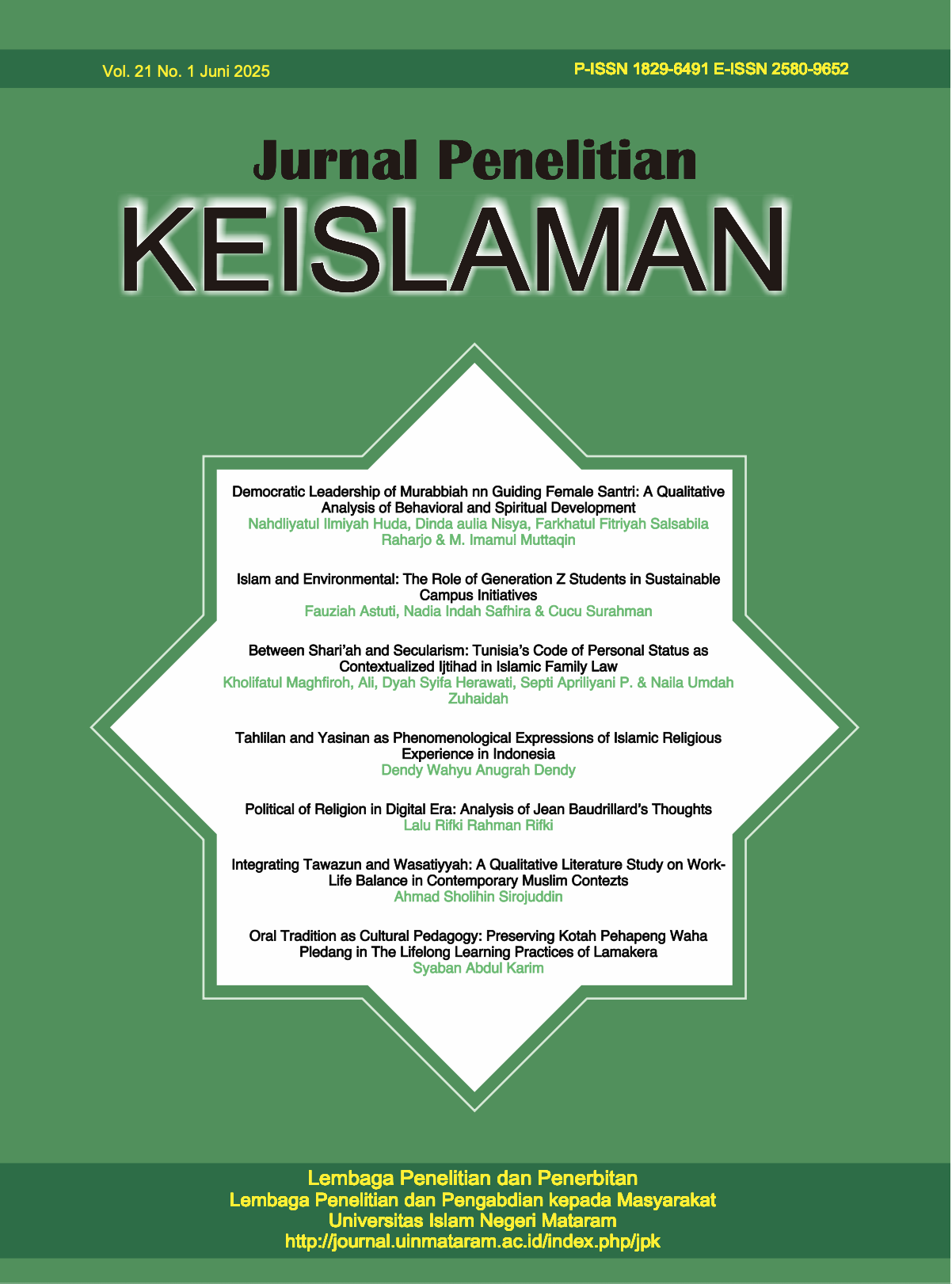Oral Tradition as Cultural Pedagogy
Preserving Kotah Pehapeng Waha Pledang in The Lifelong Learning Practices of Lamakera
DOI:
https://doi.org/10.20414/jpk.v21i1.13945Keywords:
Oral Tradition, Local Wisdom, Cultural Education, Digital Transformation, Collective IdentityAbstract
The Kotah Pehapeng–Waha Pledang oral tradition of Lamakera, East Flores, represents an intangible cultural heritage that embodies educational, moral, spiritual, and collective identity values. This study adopts a qualitative approach using literature review and a phenomenological-hermeneutic paradigm. The findings indicate that despite shifts in communication patterns and generational preferences toward digital media, the Lamakera community continues to demonstrate cultural resilience through adaptive innovation. Digital documentation, curricular integration, and active participation by community and cultural institutions are identified as key strategies for preserving the tradition. Far from being a static relic, the oral tradition acts as a medium for social identity reconstruction and value transmission within a rapidly globalizing context. This research highlights the importance of sustained preservation efforts through synergizing traditional practices with digital platforms to ensure the continued relevance of oral heritage in shaping culturally rooted and ethically grounded communities.
Downloads
References
Arta, I Gede Arya Juni. “Digitalisasi Pendidikan: Dilematisasi Dan Dehumanisasi Dalam Pembelajaran Daring Perspektif Filsafat Paulo Friere.” Prosiding Seminar Nasional IAHN-TP Palangka Raya, no. 3 (2021).
Atkinson, Andrew R. “Is Wilson’s Religion Durkheim’s, or Hobbes’s Leviathan?” History and Philosophy of the Life Sciences 43, no. 1 (2021). https://doi.org/10.1007/s40656-021-00375-w.
Barnes, R. H. “Lamakera, Solor: Ethnographic Notes on a Muslim Whaling Village of Eastern Indonesia.” Anthropos 91, no. 1–3 (1996).
Blute, Marion. “Learning, Social Learning, and Sociocultural Evolution: A Comment on Langton.” American Journal of Sociology 86, no. 6 (1981). https://doi.org/10.1086/227390.
Bourdieu, Pierre. “Pierre Bourdieu 1986 - The Forms of Capital.” Handbook of Theory and Research for the Sociology of Education, 1986.
Chan, Hum. “Bourdieu, P. (1986). The Forms of Capital. In: Richardson, J., Handbook of Theory and Research for the Sociology of Education. Westport, CT: Greenwood: 241–58.” Teflin Journal 29, no. 1 (2018).
Chotban, Sippah. “Peran Istri Menafkahi Keluarga Perspektif Hukum Islam (Studi Kasus Di Lamakera Desa Motonwutun).” Tesis, 2017.
Elfert, Maren. “UNESCO, the Faure Report, the Delors Report, and the Political Utopia of Lifelong Learning.” European Journal of Education 50, no. 1 (2015). https://doi.org/10.1111/ejed.12104.
Evrard, Amy Young. Modernity at Large: Cultural Dimensions of Globalisation. Modernity at Large: Cultural Dimensions of Globalisation, 2017. https://doi.org/10.4324/9781912128990.
Farrer, C., and C. D. Frith. “Experiencing Oneself vs Another Person as Being the Cause of an Action: The Neural Correlates of the Experience of Agency.” NeuroImage 15, no. 3 (2002). https://doi.org/10.1006/nimg.2001.1009.
Geertz. “The Interpretations of Cultures; Chapter 1.” In The Interpretations of Cultures, 1973.
Geertz, Clifford. “Thick Description: Toward an Interpretive Theory of Culture BT - The Interpretation of Cultures.” The Interpretation of Cultures, 1973.
Griffith, Malcolm, Earl Seidman, and Marshall McLuhan. “Understanding Media: The Extensions of Man.” College Composition and Communication 19, no. 1 (1968). https://doi.org/10.2307/355246.
Hall, Robert A., and Walter J. Ong. “Orality and Literacy: The Technologizing of the Word.” Language 60, no. 3 (1984). https://doi.org/10.2307/414000.
Hall, Stuart. “Representation: Cultural Representations and Signifying Practices Spectacle of the Other.” Sage Publication, 1997.
Hauptman, Robert, and Walter J. Ong. “Orality and Literacy: The Technologizing of the Word.” World Literature Today 57, no. 4 (1983). https://doi.org/10.2307/40139364.
Hymes, Dell H. “When Is Oral Narrative Poetry? Generative Form and Its Pragmatic Conditions.” Pragmatics. Quarterly Publication of the International Pragmatics Association (IPrA), 2022. https://doi.org/10.1075/prag.8.4.01hym.
Jones, Steve. “Understanding Media: The Extensions of Man.” In Encyclopedia of New Media, 2012. https://doi.org/10.4135/9781412950657.n237.
Kaare, Birgit Hertzberg. “The Self and the Institution. The Transformation of a Narrative Genre.” Nordicom Review 33, no. 2 (2012).
Lambert, Joe. Digital Storytelling Capturing Lives, Creating Community 4th Edition. Routledge. Vol. 19, 2013.
Law, Robin. “Oral Tradition as History.” In Writing and Africa, 2018. https://doi.org/10.4324/9781315505176-10.
Mahbub, Rifat. “From Gender-Not-an-Issue to Gender Is the Issue: The Educational and Migrational Pathways of Middle-Class Women Moving from Urban Bangladesh to Britain.” Gender and Education 27, no. 7 (2015). https://doi.org/10.1080/09540253.2015.1096919.
Mayer, David M., Maribeth Kuenzi, Rebecca Greenbaum, Mary Bardes, and Rommel (Bombie) Salvador. “How Low Does Ethical Leadership Flow? Test of a Trickle-down Model.” Organizational Behavior and Human Decision Processes 108, no. 1 (2009): 1–13. https://doi.org/10.1016/j.obhdp.2008.04.002.
McGinn, Noel F. “ Learning: The Treasure within: Report to Unesco of the International Commission on Education for the Twenty-First Century . Jacques Delors .” Comparative Education Review 42, no. 2 (1998). https://doi.org/10.1086/447500.
Padli, Erwin, Mohamad Khairi Bin Haji Othman, Hafizah Hajimia, Ahmad Sanusi, and Ahmad Aprillah. “Discourse Tradition and Religious Education: Islamic Educational Values In The Perang Timbung Cultural Practice.” Tafkir: Interdisciplinary Journal of Islamic Education 6, no. 2 (2025): 420–35. https://doi.org/10.31538/tijie.v6i2.1807.
Taisir, Muhammad, Ahmad Sanusi, and Ahmad Aprillah. “Integrating Khidmah and Tarbiyah?: A Service-Learning Model in Indonesia ’ s Islamic Boarding School Education.” Al-Hayat: Journal of Islamic Education 9, no. 2 (2025): 347–68. https://doi.org/https://doi.org/10.35723/ajie.v9i2.151.
Tawil, Sobhi, Marie Cougoureux, Cougoureux, and Marie. “Revisiting Learning the Treasure within: Assessing the Influence of the 1996 Delors Report.” UNESCO Education Research and Foresight: Occasional Papers, no. 4 (2013).
Trainor, Paul. “Orality and Literacy: The Technologizing of the Word. By Walter Ong.” The Modern Schoolman 62, no. 1 (1984). https://doi.org/10.5840/schoolman198462116.
Venema, Henry. “Oneself as Another or Another as Oneself?” Literature and Theology 16, no. 4 (2002). https://doi.org/10.1093/litthe/16.4.410.
Weber, Max. “Economy and Society: An Outline of Interpretive Sociology.” In Readings in Economic Sociology, 2008. https://doi.org/10.1002/9780470755679.ch3.
Downloads
Published
Issue
Section
License
Copyright (c) 2025 syakban abdul karim

This work is licensed under a Creative Commons Attribution-ShareAlike 4.0 International License.













